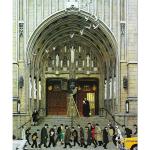Christian reception of the work of Walter Benjamin is often set in the context of Christian reception of Jewish messianism or Jewish apocalyptic. In a brilliant summary of Benjamin, Cyril O’Regan (Theology and the Spaces of Apocalyptic, 61-8) contests this characterization.
Despite Benjamin’s claim that he is settled in the tradition of Kabbalah, he dispenses with all the textual interest of Kabbalah: He “neither leaves intact the interpretive steps of classical Kabbalah, nor acknowledges the sacredness of the texts submitted to speculative exegesis, nor rests easy with its speculative content.” When Benjamin is done, all that’s left is the notion that intuition comes in a glimpse, a “lightning flash,” an Augenblick. Carnage is everywhere, but the messianic bursts in as no more than a flicker in the darkness (64).
As O’Regan says, this is “antithetical to Torah Judaism,” and also “highly eccentric with respect to the Jewish mystical tradition,” which remains Jewish in its hope for a real Messiah who redeems the world (67).
O”Regan thinks this is good news: “when Benjamin’s form of apocalyptic is rejected by a Christian proponent of a maximally eidetic apocalyptic (Balthasar), good relations between Judaism and Christianity are not at stake, and contrariwise, when Benjamin’s form of apocalyptic is accepted as it is by Metz, the embrace of Benjamin’s apocalyptic ought not be confused with the embrace of Judaism” (67).














